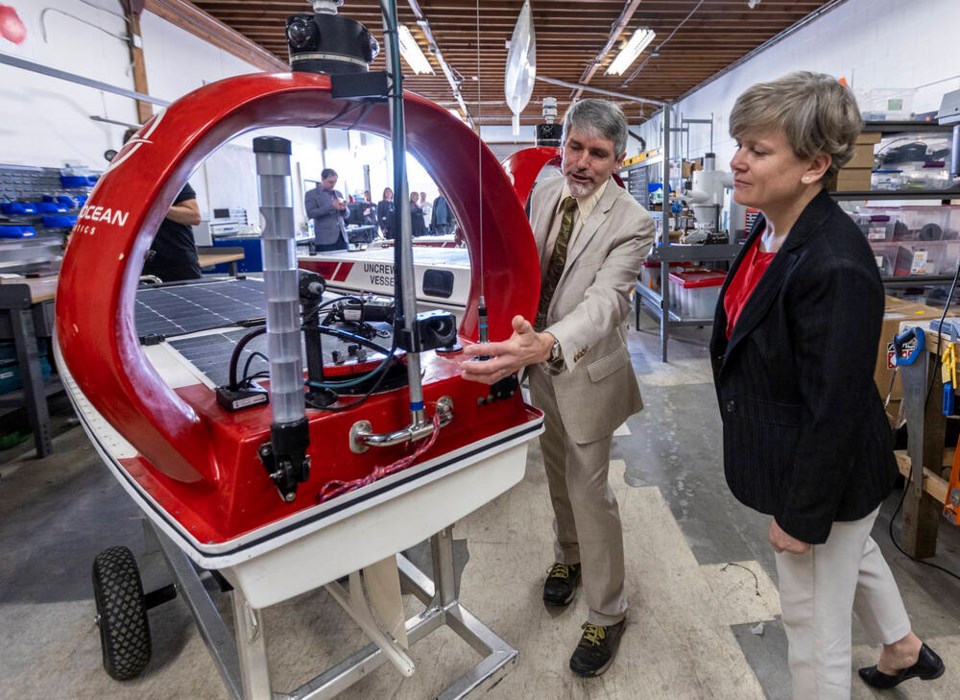B.C. low-carbon initiatives getting millions in grants from province

A five-year-old Victoria company has received $1.75 million from the province to continue developing solar-powered unmanned vessels to collect data from the ocean and instantly send it to its home base on land.
Open Ocean Robotics’ surface vehicles are equipped with sensors, cameras and communication technology. Out on the ocean, these autonomous vehicles can travel for months, withstand stormy conditions and they do not produce greenhouse gases.
The company is one example of emerging “blue” technology in B.C.
A total of $7 million from the province’s Innovative Clean Energy Fund was announced Tuesday for seven projects.
Julie Angus, chief executive of Open Ocean Robotics, said, “This investment in sustainable ocean technology will help advance the maritime economy and beyond. It will protect oceans, reduce greenhouse gases and increase safety at sea.”
We need to better understand the oceans in order to protect them, Angus said. “We know very little about our oceans and have only touched upon the opportunities in the blue economy.”
The company has a team of 30 and is a global leader in using technology for more sustainable ocean monitoring, she said.
Uses so far include monitoring waters to help protected endangered southern resident killer whales and to combat illegal fishing, Angus said.
Another $2 million went to the South Island Prosperity Partnership’s Centre for Ocean Applied Sustainable Technologies (COAST) to work as a catalyst for the blue economy along the coast. This organization is filling a gap in the marine sector by connecting emerging technologies to shipping, shipbuilding, and defence and aerospace industries.
Emilie de Rosenroll, chief executive of COAST, said the organization is bringing stakeholders together to develop competitive advantages.
Josie Osborne, minister of Energy, Mines and Low Carbon Innovation, said this work will help the province transition to a low-carbon economy.
Since 2008, the innovative clean energy fund has provided $112 million to support clean-energy projects. “Reducing greenhouse gases and other pollution is critical to meeting our climate goals” within B.C.’s climate action plan, Osborne said.
“The impacts of climate change are all around us and people in B.C. know that delay is not an option.”
Other projects receiving funds:
• Pani Energy of Victoria uses artificial intelligence to optimize water-treatment infrastructure to cut energy use by up to 10 per cent and reduce chemical use by 10 per cent.
• Axine Water of Vancouver develops and sells electrochemistry technology. Its waste-water treatment system features improvements in hardware and software.
• Ecoation Innovation of North Vancouver is aiming to develop and demonstrate technology for greenhouses to reduce pesticide use and increase yield from crops.
• Terramera of Vancouver focuses on creating remote-sensing and data-enabled verification technology to give accurate estimates of soil carbon and a history of how a specific piece of land has been farmed in the past.
‘• Miru Smart Technologies of Vancouver creates electromagnetic windows that tint electronically. This translates to energy savings and reduces greenhouse gas emissions.
cjwilson@timescolonist.com
Two Victoria companies receive funding for ocean projects
Posted: Mar. 28, 2023
Open Ocean Robotics has received money for its uncrewed vehicles that can capture information and send it back to researchers instantly.
The provincial government has given funding to two Victoria companies to support creating jobs ocean-based jobs.
Open Ocean Robotics and South Island Prosperity Partnership’s Centre for Ocean Applied Sustainable Technologies (COAST) are the two companies receiving money.
“B.C. innovators are building connections, developing technology and fuelling research that will help transition B.C. to a low-carbon economy, including in the ocean-based sector,” said Josie Osborne, minister of energy, mines and low-carbon innovation.
“Support for these leading-edge, pre-commercial projects ensures that British Columbians can continue to benefit from the growth and diversification of our first-class clean-technology sector.”
Open Ocean Robotics is receiving $1.75 million to develop uncrewed surface vehicles that are solar-powered and have sensors, cameras, and communication devices that can capture information and relay it back to researchers instantly.
“Our oceans are inherently extremely difficult to monitor when you think about the challenges of putting a crewed ship out on the water,” Julie Angus, the CEO of Open Ocean Robotics said. “So these autonomous boats can go out there for a fraction of the cost without putting any people at risk, and they’re completely zero emission.”
RELATED: Road to Recovery: How solar-powered robot boats fit into the ocean economy
Angus says one of the benefits is these boats can go out for months at a time and can communicate with researchers no matter where they are in the ocean by satellite, radio, or cellular and they are remote-controlled from Victoria.
COAST is receiving $2 million to work with other companies, researchers, or startups to connect them and help find new opportunities in ocean-related fields and to make ocean sectors more sustainable.
“The oceans are at the front lines of climate change, we’re seeing there’s so much pollution that’s occurring from maritime shipping,” Emilie de Rosenroll, the inaugural chief executive officer of COAST said.
“There’s some very aggressive targets to reduce that, the GHG reduction, so oceans are really at the forefront of a lot of different places where climate change is really, really something that’s very visible.”
These two projects are part of the seven total that the government is funding through its Innovative Clean Energy program, which aims to advance B.C.’s clean energy sector.
No comments:
Post a Comment